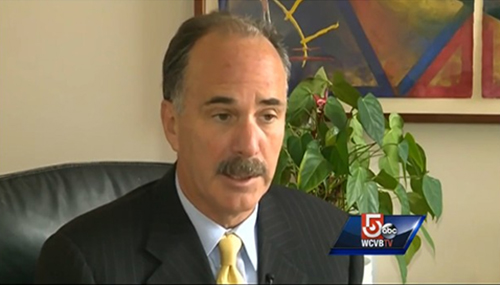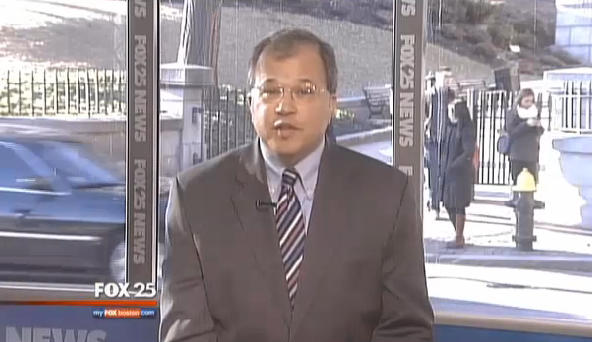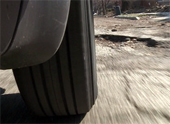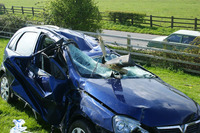Posts Tagged ‘“car accident”’
Woman Killed By Flyaway Manhole Cover on Southeast Expressway
 A woman died tragically this morning on the Southeast Expressway heading southbound, when a manhole cover became dislodged, went airborne, struck the front windshield and exited the rear windshield. She was killed instantly. The incident occurred in the Thomas P. O’Neill Junior Tunnel just before the southbound end of the tunnel.
A woman died tragically this morning on the Southeast Expressway heading southbound, when a manhole cover became dislodged, went airborne, struck the front windshield and exited the rear windshield. She was killed instantly. The incident occurred in the Thomas P. O’Neill Junior Tunnel just before the southbound end of the tunnel.
The woman’s vehicle came to a rest in the left-hand lane of the Southeast Expressway, a short distance from the Massachusetts Avenue exit, with large gaping holes in the front and rear windshields. A state police spokesperson commented that the cause of the manhole cover to become dislodged is under investigation.
The focus of the State Police investigation will be what caused the manhole cover to become a projectile which killed this unsuspecting driver. Manhole covers, when properly installed and maintained, should remain in place. It needs to be determined whether any work had been done recently on or around this manhole.
Attorney Marc Breakstone, who has litigated personal injury cases involving roadway defects and manholes, was interviewed by The Boston Globe.
“I’m guessing the rear wheel or wheels of a heavy vehicle passed over the manhole, catching the exposed lip of the cover, and from the traction of the tire dislodged and caused the cover to become a projectile which flew through the passenger compartment of this poor woman’s car,” he said, when interviewed a few hours after the accident. Read the full article.
The typical manhole used on our state highways is constructed of cast-iron or concrete or made out of a combination of the two. They typically weigh upwards of 110 pounds and are designed, once in place, to remain in place. The weight, shape and fit of manholes are designed to help keep them in place when traffic passes over them. This manhole cover may have become dislodged as a result of either improper placement, improper maintenance of the manhole and/or improper manufacture of the cover.
About Breakstone, White & Gluck
The Boston personal injury attorneys at Breakstone, White & Gluck have over 100 years combined experience representing clients in serious motor vehicle accident cases involving injuries and deaths due to defects in roadways and flying projectiles. If you have been injured, it is important to learn your rights. For a free legal consultation, contact us today at 800-379-1244 or 617-723-7676 or use our contact form.
Attorney Marc L. Breakstone Says Clients Feel Former New England Patriots Player Brandon Spikes “Got Off Lightly” With Probation

Click here to view the interview on WCVB.
Former New England Patriots player Brandon Spikes pled guilty yesterday to criminal charges in the hit-and-run car crash which injured a family of three on I-495 in Foxborough. He was sentenced to one year probation and loss of license.
Attorney Marc L. Breakstone of Breakstone, White & Gluck represents the family.
“They feel that he got off lightly for engaging in conduct that could have killed them frankly,” Breakstone told WCVB.
Early on June 7, Spikes was driving his Mercedes-Benz Maybach on I-495 in Foxborough and struck the Nissan Murano carrying Breakstone’s clients. He was traveling without headlights and hit the family’s car at a high-speed, but never stopped.
They were treated at a local hospital. Police found his vehicle abandoned nearby, after his on-board navigation company reported the driver stated he had hit a deer. Spikes, who had just returned to the New England Patriots a month earlier, was released by the team shortly later.
Yesterday in Wrentham District Court, Spikes was found responsible for speeding and a marked lanes violation as well. He also admitted prosecutors had sufficient facts to convict him on charges of negligent operation and driving an uninsured vehicle. Those charges were continued without a finding for one year and Spikes could avoid conviction if he stays out of trouble.
Breakstone told The Boston Herald his clients are, “very lucky not to have been killed. They’re still traumatized by this incident. This guy, hopefully, learned a lesson that will change his behavior going forward.”
Driving without auto insurance is against the law in Massachusetts and punishable by a fine or up to one year in a house of correction.
“This is a trifecta of irresponsibility; no insurance, reckless driving, leaving the scene in a cowardly fashion,” Breakstone told Fox 25 TV.
Boston News, Weather, Sports | FOX 25 | MyFoxBoston
Coverage: The Boston Herald, The Boston Globe, WCVB, Fox 25 TV Boston and WHDH.
Attorney Marc L. Breakstone Responds After State Police Announce Former Patriots Player Brandon Spikes Will Be Charged With Leaving Scene of Personal Injury Crash
Attorney Marc L. Breakstone spoke to Fox 25 News Boston after State Police issued a citation charging former New England Patriots linebacker Brandon Spikes in the hit-and-run accident that injured a family of three. Breakstone is representing the family.
“It’s surprising to them that Mr. Spikes would drive so recklessly and then just leave the scene,” Breakstone told the news station. “It will affect them for a long time. This could have been a story with a tragic ending.”
Spikes will be charged with leaving the scene of a personal injury crash, operating a motor vehicle negligently to endanger, speeding and failure to stay within marked lanes. He was cut by the New England Patriots after State Police opened the investigation.
Massachusetts Court Judgment is Tragic Reminder About the Social Host Liability Law
A Massachusetts court judgment this week is a tragic reminder of what can happen when teens drink and drive and social host liability laws are ignored.
On Monday, 23-year-old Craig Snow was ordered to pay $1 million each to the parents of Julia Gauthier. In 2010, 19-year-old Gauthier, a freshmen at Salem State College, was killed in a car accident in Lynn when her boyfriend Christopher Maxson rolled the SUV he was driving. She and Maxson had just left a party hosted by Snow, who had provided the alcohol that night. Maxson pled guilty to motor vehicle homicide while driving drunk in December 2010.
Snow was charged criminally under Massachusetts’ social host liability law, but avoided jail time. Gauthier’s family also filed a civil lawsuit against him, resulting in this week’s judgment.

“The question here is reasonableness and you should not furnish so much alcohol to any guest that you have that they leave your house inebriated,” attorney David White said in a television interview this week with FOX 25 News Boston.
White added, “It’s a real strong reminder to parents as the graduation season approaches to take extra care to make sure their children aren’t driving drunk.”
Watch the Fox 25 News Boston interview.
Read more about the social host liability law on our website.
Read More
Child Passenger Safety Week September 15-21

Many parents follow the law and fasten their children into child passenger safety seats. But the National Highway Traffic Safety Administration (NHTSA) says three out of four are doing it incorrectly, leaving children vulnerable to serious injuries.
There is a lot of confusion about child passenger safety seats. They are challenging for parents to position and laws change every few years. Additionally, each state has its own law. But they are important. Child safety seats reduce the risk of death for infants by 71 percent, according to the Centers for Disease Control and Prevention (CDC). The figure is 54 percent for toddlers ages 1 to 4.
September is a good time for parents to have their child’s passenger safety seat inspected for free. The NHTSA and communities across the country will hold Child Passenger Safety Week is Sept. 15 – 21. Sept. 21 is National Seat Check Saturday. You can search this database or this website to find a child seat inspection station near you (we suggest you call in advance to check).
There are inspection stations in Boston, Cambridge, Somerville and many other Massachusetts communities. These technicians should be certified and trained in the NHTSA curriculum. Some stations, such as local police departments, are often available to help parents throughout the year if you call for an appointment.
Massachusetts Child Passenger Safety Law
The Massachusetts Child Passenger Safety Law requires all children to use child passenger restraints until they are 8 years old or over 57 inches tall (4′ 9″). Up until 2008, the law only required children under 5 years of age and 40 lbs to ride in a safety seat.
There are four types of car seats: infant carrier seats, rear-facing convertible seats, forward-facing seats and booster seats, for children ages 4 until they are 8 years old in Massachusetts. When children turn 8 and are 57 inches tall, they can move into a seatbelt. The state recommends children travel in the backseat wearing a seatbelt until they are age 13.
Use of a booster seat reduces the risk of fatal injury for children ages 4 – 8 by 55 to 67 percent compared to unrestrained children and adults, according to a recent article in the University of Michigan Transportation Research Institute.
Another Change in Law May Be Coming
Another change may be coming for child passenger safety seats, but if so, the requirement will not be effective until February 2014.
The NHTSA has proposed that a child car seat be secured by a seat belt and top tether rather than the Latch system, according to the Wall Street Journal. In 2002, the Latch system became a federal requirement and new cars had to have anchor points between cushions so child safety seats could be secured.
The reason for the change is car seats were lighter a decade ago. Children were not required to use them for as many years as they are under today’s laws. The changes would include new labeling for car seats identifying the weight limits. The Juvenile Products Manufacturers Association represents child seat makers and is asking for the new requirement to be suspended and instead for the weight limits to be increased for the back seat anchors.
Related:
Court Ruling on MedPay Coverage Favorable to Massachusetts Drivers
 The Supreme Judicial Court recently issued a ruling favorable to Massachusetts drivers on the subject of medical payments coverage in the standard Massachusetts automobile insurance policy.
The Supreme Judicial Court recently issued a ruling favorable to Massachusetts drivers on the subject of medical payments coverage in the standard Massachusetts automobile insurance policy.
Medical payment coverage, often called MedPay, is one of eight optional coverages which drivers can purchase on their auto insurance policy. All Massachusetts drivers are required to purchase compulsory coverage, which includes $8,000 in Personal Injury Protection (PIP) benefits. They can also purchase other optional coverage types, such as MedPay. This pays co-pays and deductibles not covered by PIP benefits and medical services not covered by your health insurance policy.
In Golchin vs. Liberty Mutual Insurance Company, SJC-11305, the plaintiff suffered serious personal injuries traveling as a passenger in her husband’s car. Her medical expenses exceeded $100,000.
The car was insured by Liberty Mutual and the policy had up to $25,000 in optional MedPay benefits. Golchin had a health insurance policy with Blue Cross Blue Shield, which paid her medical bills (expenses totaled $100,883, but Blue Cross actually paid $32,033). Blue Cross placed a lien in this amount on any award Golchin received from her car accident case.
Golchin submitted documentation of medical expenses to Liberty Mutual, seeking coverage under MedPay. The insurance company refused the payment, claiming it was not required since Blue Cross had already paid the bills. When she settled her personal injury case, Golchin had to pay Blue Cross $32,033 out of her award to satisfy the lien, even though she had MedPay coverage.
Golchin filed her lawsuit in Worcester Superior Court in September 2008, alleging a breach of contract, a breach of implied covenant of good faith and fair dealing, and a violation of G.L. c. 93A, § 2.
In its August 8, 2013 decision, the Supreme Judicial Court held that Liberty Mutual could not avoid the payment of the medical payments coverage, and that the standard Massachusetts auto insurance policy provided for payments to the insured even when the health insurance company had made the payment.
There was certainly no unjust enrichment of the plaintiff in this case; all she got is what she had already paid for, and the auto insurance payment will only replace some of what was paid to the health insurance company to satisfy its lien.
Did you know that health insurance companies can recover their payments from your bodily injury claim? Most clients are stunned when they realize that their health insurance company can demand repayment of the bills that they paid. So even if you have great health insurance, the company will claim a lien on any personal injury case you have, and has the right to get paid, even before you do, and even if the settlement amount is not enough to cover all of your damages. Some insurance companies will negotiate their liens; others are not so sympathetic. Medical payments coverage on an auto policy is a good way to insure against lien repayments, and the cost of the coverage is very low.
Do you have MedPay coverage?
Ask your auto insurance agent if you have MedPay coverage. To learn more, read: Understanding and Buying Massachusetts Car Accident Insurance.
Read More
Filmmaker Explores Painful Consequences of Texting While Driving
We want to share a story we heard on NPR this morning. Texting while driving remains one of the leading safety hazards on our roads today, despite years of public service announcements, educational campaigns and media stories of tragedy.
German filmmaker Werner Herzog has now released a new and less traditional public service announcement. In an in-depth 35-minute film, he speaks to victims, families, law enforcement and drivers who made the mistake. In one case, he shows the daughter of a victim reunited with the driver who killed her father. In another case, a woman who was seriously injured by a texting driver faced more than a million dollars in medical bills.
The film is called, “From One Second to the Next,” and can be viewed below. It is part of the AT&T “It Can Wait” campaign.
In the NPR interview, Herzog said: “The message is very, very simple. Don’t text and drive.”
https://www.youtube.com/watch?v=_BqFkRwdFZ0
Read More
What to Know About Potholes and Car Accidents

In Massachusetts, we are making the long-awaited transition from winter to spring.
For drivers, that means trading in the challenge of navigating snow-packed roads for dodging potholes.
While potholes often start as small pavement cracks, they can expand quickly if left unrepaired. Hitting even a small pothole can cause hundreds or thousands of dollars in damage to your car as well as serious injury if the driver loses control of the vehicle. Accidents often happen when private property owners and government entities fail to quickly repair roads or set up signage alerting drivers to roadway defects. The law requires all persons to maintain roadways, driveways and sidewalks in a reasonably safe manner. But it also allows a reasonable amount of time to discover and repair the defect.
Around Boston, some communities report hundreds of pot hole car accidents and incidents each year. The city of Boston is trying a new approach to hasten repairs by developing a smart phone app called Street Bump which allows drivers to send the city alerts about defective roadways which need to be fixed.
If Your Car is Damaged by a Roadway Defect
If your car is damaged or you are injured because of a roadway defect,
you can expect your auto insurance collision coverage will cover the damage,
but you will be subject to your deductible, which is often $500 or more. You may also be entitled to other compensation depending on where your accident happened.
It is important to consult an attorney promptly if you are injured in order to protect all of your rights. Here are a few points to keep in mind:
Private Property. Commercial property owners invite the public onto their property for business and have a responsibility to maintain their premises,
including parking lots and driveways, in a reasonably safe manner. If the damage or injury is caused by the negligence of the property owner, then the owner’s liability insurance should cover the losses. The same rule applies to a private landowner; there is a duty to maintain driveways, parking areas, and walkways in a reasonably safe manner for all lawful visitors.
Roads and Highways. Under M.G.L. c. 84, Section 15, cities and towns must properly maintain their public ways. If a community fails to do so and had reasonable notice of the defect, a person injured in an accident on a local road may seek up to $5,000. The municipality must have known about the defect or should have learned of the defect in the exercise of due care and diligence. Gregorie v. Lowell, 253 Mass. 119 (1925). Perfection in road maintenance is not required. Zacherer v. Wakefield, 291 Mass. 90 (1935).
The city or town must receive written notice of the defect within 30 days. Proper written notice is an absolute requirement. In addition, there is an iron-clad $5,000 cap on damages. Unfortunately, any negligence on the part of the driver will be a complete bar to recovery; the rule of comparative negligence does not apply.
In Summary
In summary, potholes are a way of life in Massachusetts. If you have the misfortune of suffering a loss due to a pothole on a public way, there is little likelihood of obtaining relief from any public entity.
Toyota Settles One of First Wrongful Death Cases
 A month after being assessed a record $17.4 million fine, Toyota Motor Corp. has settled one of the first wrongful death lawsuits involving sudden and unintended acceleration by its vehicles.
A month after being assessed a record $17.4 million fine, Toyota Motor Corp. has settled one of the first wrongful death lawsuits involving sudden and unintended acceleration by its vehicles.
The Japanese automaker confirmed last week it had reached an agreement with the family of Paul Van Alfen and his son’s fiancee, Charlene Jones Lloyd, for an undisclosed amount in the November 2010 accident in which they died, USA Today reported. The automaker said it has also settled another case filed under California’s lemon law by a retired Los Angeles police officer.
Van Alfen and Lloyd were killed in 2010 when the Toyota Camry they were traveling in on Interstate 80 in Utah suddenly accelerated. Van Alfen, the driver, attempted to stop the vehicle, but ran through a stop sign and into a wall. His other passengers, his wife and his son, were injured. The Utah Highway Patrol investigated and determined the car accident was the result of a sticking gas pedal.
Other Injury Lawsuits. The settlement comes as a group of lawsuits consolidated in U.S. District Court in Santa Ana, California moves forward. Prior to the consolidation, Toyota had also reached a $10 million settlement in a case involving an auto accident which killed a California police officer and his family.
The officer and his family were killed near San Diego in 2009 when their Lexus accelerated above 120 mph, struck an SUV, rolled off an embankment and burst into flames. The car accident was blamed on a improperly sized floor mat which was trapped in the accelerator.
More Than $1 Billion Settlement. In December 2012, Toyota agreed to a settlement worth more than $1 billion to resolve hundreds of lawsuits claiming economic losses by car owners affected by its recalls. In recent years, the car manufacturer has recalled more than 14 million vehicles due to acceleration problems and brake defects.
$17.4 Million Fine. The National Highway Traffic Safety Administration issued Toyota a $17.4 million fine for safety defects in December 2012, the largest ever imposed. In 2010, the company paid a total of $48.8 in a series of three fines.
Related:
Toyota settles first wrongful death lawsuit, USA Today.
Toyota tackles acceleration lawsuits; questions remain, USA Today.
Toyota reaches $1 billion settlement in acceleration cases, USA Today.
Read More
Drowsy Driving Accidents Are Preventable
 Younger drivers are the most likely to drive drowsy, with one out of seven drivers ages 16-24 admitting to nodding off behind the wheel at least once in the past year, a National Sleep Foundation study found.
Younger drivers are the most likely to drive drowsy, with one out of seven drivers ages 16-24 admitting to nodding off behind the wheel at least once in the past year, a National Sleep Foundation study found.
The National Sleep Foundation released its study for its annual campaign, Drowsy Driving Prevention Week, from Nov. 12-18. The foundation’s study also found one in 10 of all licensed drivers admitted to falling asleep during the past 12 months. The AAA Foundation for Traffic Safety estimates that about one in six deadly car crashes involves a drowsy driver. In addition to drivers who are falling asleep, the National Sleep Foundation’s 2011 Sleep in America poll found that among those who drove, 52 percent indicated they have driven drowsy and 37 percent had done so in the past month.
Across the country, four states have laws related to drowsy driving: New Jersey, California, Utah and Florida.
The laws vary, providing for a mix of educational campaigns, research and in New Jersey, a law criminalizing drowsy driving. Maggie’s Law states a drowsy driver – one who has not slept in 24 hours – qualifies as a reckless driver who can be convicted of vehicular homicide. The law was passed in 2002 following a car accident which claimed the life of 20-year-old college student Maggie McDonnell. The student was struck by a driver who had not slept for 30 hours and had been using drugs.
The jury deadlocked in the first trial involving the fatal car crash. During the second trial, the defense lawyers argued that there was no law against falling sleep behind the wheel in New Jersey so the driver did nothing wrong. The driver received a suspended jail sentence and $200 fine.
In Massachusetts, Sen. Richard T. Moore, (D-Uxbridge) has proposed “Rob’s Law,” which was placed under a study order this summer. The legislation is named for Major. Robert Raneri of the United States Army Reserve, who was killed in 2002 by an admitted drowsy driver on his way to work at Fort Devens.
The bill would make it a criminal offense for drivers to drive drowsy in Massachusetts. In cases where drivers cause a car accident resulting in death, they could be charged with homicide by a motor vehicle while under the influence of an intoxicating substance.
Drowsy driving car accidents can be prevented through awareness and good decisions. Our Boston car accident attorneys offer this list of signs which should serve as warnings not to drive:
- Difficulty focusing, frequent blinking and heavy eyelids.
- Driving mistakes such as drifting from your lane and swerving.
- Not seeing other cars until they are immediately near you.
- Daydreaming.
- Trouble keeping your head up.
- Disobeying traffic lights or failure to see them change until another driver honks.
- Missing traffic exits.
- Not remembering traveling the last few miles.
- Yawning.
- Restlessness, irritability or aggression.
Other steps to avoid drowsy driving and car accidents:
- Get a good night’s sleep of seven to nine hours at night.
- Do not be in a rush to arrive at your destination.
- Avoid driving long distances alone when you can.
- Avoid alcohol and medications that cause drowsiness.
- Consume caffeine if you need it.
- Avoid driving at times you are normally asleep.
- For long distance travel, take a break every 100 miles or 2 hours. Get a snack, change drivers, take a walk.
- Make sure you eat regular meals and snacks.
- If you need, stop and find a safe place to nap.
- Avoid alcohol and medications that cause drowsiness.
Related:
Bill S.1773: An Act relative to drowsy driving.
Drowsy Driving, National Sleep Foundation.
Read More

